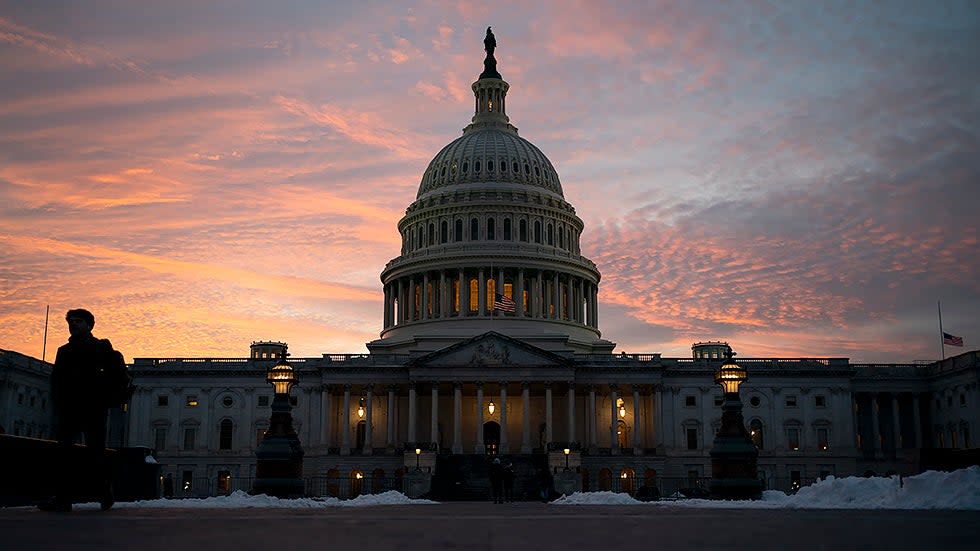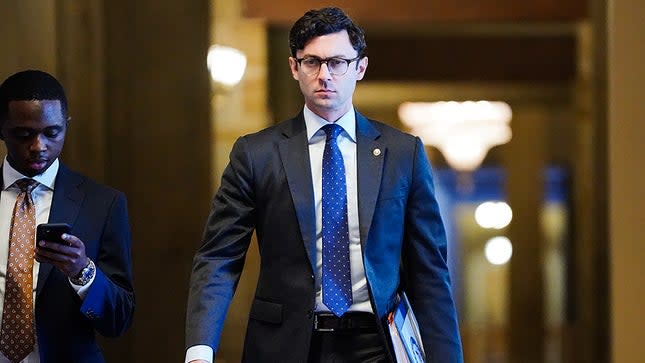On The Money — Ban on stock trading for Congress gains steam

Happy Wednesday and welcome to On The Money, your nightly guide to everything affecting your bills, bank account and bottom line. Subscribe here: thehill.com/newsletter-signup.
Today's Big Deal: The bipartisan push to bar lawmakers from trading stocks has more momentum than ever. We'll also look at Democrats' acknowledgment that they'll need to reduce the size of the Build Back Better Act and the stock market correction fueled by concerns about rising interest rates.
But first, the Missouri State Highway Patrol is a big fan of Batman.
For The Hill, we're Sylvan Lane, Aris Folley and Karl Evers-Hillstrom. Reach us at slane@thehill.com or @SylvanLane, afolley@thehill.com or @ArisFolley and kevers@thehill.com or @KarlMEvers.
Let's get to it.
Momentum builds to block stock trading

The push to bar lawmakers from trading stocks is gaining momentum as lawmakers and congressional candidates in both parties seek to capitalize on the proposal's huge popularity.
Last week, Sens. Jon Ossoff (D-Ga.) and Mark Kelly (D-Ariz.) introduced a bill to require lawmakers to put their stocks in a blind trust. Sen. Josh Hawley (R-Mo.) unveiled his own stock trading ban on the same day. Those follow similar House bills introduced last year, including a proposal from Reps. Abigail Spanberger (D-Va.) and Chip Roy (R-Texas).
The influx of legislation follows explosive allegations of insider trading against prominent lawmakers, Speaker Nancy Pelosi's (D-Calif.) defense of congressional stock trading and polling showing that most Americans want to crack down on the practice.
Penalties vary wildly between the different proposals, with the Ossoff-Kelly bill forcing violators to forfeit their congressional salary and the Hawley bill requiring them to forfeit their investment income to the Treasury.
All of the bills allow lawmakers to put their assets in a blind trust rather than divest from their stocks.
Ethics experts see the blind trust as the best way to effectively end stock trading without forcing lawmakers to sell their assets, but they warn that without robust enforcement it could lead to "the worst-case scenario where the public doesn't know what the investments are but the member does."
Lawmakers will have to decide which bill is the most effective at addressing the problem and convince congressional leaders to get on board.
Pelosi recently directed Rep. Zoe Lofgren (D-Calif.), chairwoman of the House Administration Committee, to explore stiffer penalties for lawmakers who violate existing stock trading rules, but advocates say that Congress cannot fix the problem without new legislation.
Karl has more on the push here.
Read more: Joining Pelosi, Hoyer says lawmakers should be free to trade stocks
BABY BBB
Desperate Dems signal support for cutting Biden bill down
House Democratic leaders scrambling to salvage President Biden's massive health, climate and education package are facing plenty of internal disputes about the best strategy in the coming weeks - with one big exception.
Doing nothing, all sides agree, is not an option.
Vulnerable Democrats facing tough reelections are desperate for a big victory to bring home to their districts ahead of the midterm elections. Liberal lawmakers fighting to install historic social benefits see this year as their last, best chance to do so, given the tough odds facing Democrats in those elections. Environmentally minded Democrats are warning of the urgent need to tackle climate change.
And with Biden's approval rating underwater, party leaders are racing to reverse the trend - and boost morale among dispirited base voters - if they're to have any chance of preserving the chamber in November.
Sen. Joe Manchin's (D-W.Va.) entrenched opposition to the House-passed $2.2 trillion bill has led House Democrats of all stripes to acknowledge the need to scale back the package if they're to get it to Biden's desk.
As Congress returned to Washington last week from a long holiday break, Speaker Pelosi (D-Calif.) maddressed the caucus behind closed doors and made clear that the package remains a priority - whatever form it ultimately takes.
Success will require support from liberals - who were already grumbling that $2.2 trillion was too small and will now have to accept something even smaller - and vulnerable lawmakers, some of whom are calling for leadership to break Build Back Better into smaller components and pass them individually.
The Hill's Mike Lillis and Scott Wong have the details here.
Read more: Biden on spending plan: 'We're going to have to probably break it up'
The Hill Virtually Live's Future of Cities Summit-Thursday, Jan. 20 at 1 PM ET
U.S. cities are diverse, dynamic and constantly evolving. With added challenges come increased opportunities to reshape our existing structures and build more sustainable cityscapes, enhancing economic stability and improving the lives of all residents. Join The Hill for a conversation with mayors from across the country at The Future of Cities Summit. RSVP today.
Nasdaq hits correction territory

Stocks sank Wednesday as concerns about rising interest rates and the economic impact of the omicron variant pushed the Nasdaq composite into correction territory.
The tech-heavy Nasdaq fell almost 1.2 percent to sink 10 percent below a record set in November. Investors consider a stock or index to be in a correction after it falls 10 percent from its most recent 52-week high.
Both the Dow Jones Industrial Average and S&P 500 index fell 1 percent.
Stocks have fallen throughout January as Wall Street braces for a series of interest rate hikes from the Federal Reserve. The Fed is expected to begin raising interest rates from the near-zero baseline set in March 2020 after several months of rising inflation.
Rising interest rates tend to sap momentum from stock prices as companies face narrower profit margins and potentially pull back on hiring or investments.
Technology stocks are particularly sensitive to higher interest rates since tech companies tend to borrow more than firms in other industries.
Sylvan explains here.
CRUZ CHALLENGE GETS COURT HEARING
Justices appear divided over Cruz campaign finance challenge
A divided Supreme Court on Wednesday grappled with Sen. Ted Cruz's (R-Texas) challenge to limits on the amount of money candidates can raise from donors to pay off their personal debt after an election.
The questions posed during an hour-long oral argument did not clearly telegraph an outcome. But the justices seemed to split along familiar ideological lines in the highest-profile campaign finance dispute to reach the 6-3 conservative majority court, with at least four of the court's more conservative members appearing receptive to Cruz's challenge.
At issue is whether a section of the 2002 Bipartisan Campaign Reform Act violates the First Amendment by setting a $250,000 cap on the amount of post-election funds a candidate can be repaid for personal loans they made to their campaign.
Karl and our colleague John Kruzel break it down here.
NY'S TRUMP PROBE: FIVE THINGS TO KNOW
New York Attorney General Letitia James (D) made waves late Tuesday night, detailing preliminary evidence from her office's investigation into former President Trump's family business and accusing the company of repeatedly misrepresenting its assets over the years.
The revelations came in court filings asking a judge to order Trump, his son Donald Trump Jr. and his daughter Ivanka Trump to comply with the attorney general's subpoenas for their testimony in the probe.
Here are five things to know about the development and the attorney general's ongoing investigation-including its unusual focus and implications for Trump-from The Hill's John Kruzel.
Good to Know

Procter & Gamble is raising its prices on Tide and other personal health care products amid rising inflation.
The company said in an earnings call Wednesday it would be raising prices on fabric care, baby care, feminine care, adult incontinence, family care, home care, hair care, grooming, oral care and skincare products, CNBC reported.
Here's what else we have our eye on:
Federal Trade Commission chair Lina Khan promised her agency won't back down from investigations into Big Tech companies during her first TV interview in the role.
Starbucks is scrapping its COVID-19 vaccine requirement for U.S. workers after the Supreme Court blocked the Biden's administration's vaccine-or-test mandate for large employers last week.
The White House on Wednesday established a council of officials from dozens of federal agencies to guide the administration's efforts to boost purchasing of U.S.-made goods.
A Palm Bay, Fla., man has been handed a five-year prison sentence in connection to a scheme in which he collected more than $1 million in federal coronavirus relief funds, according to the Department of Justice.
That's it for today. Thanks for reading and check out The Hill's Finance page for the latest news and coverage. We'll see you Thursday.
